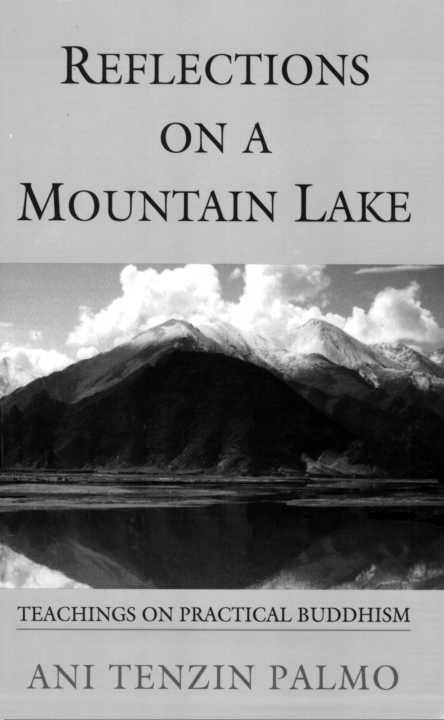
Reflections on a Mountain Lake
REFLECTIONS

MOUNTAIN LAKE
Teachings on Practical Buddhism

Venerable Tenzin Palmo


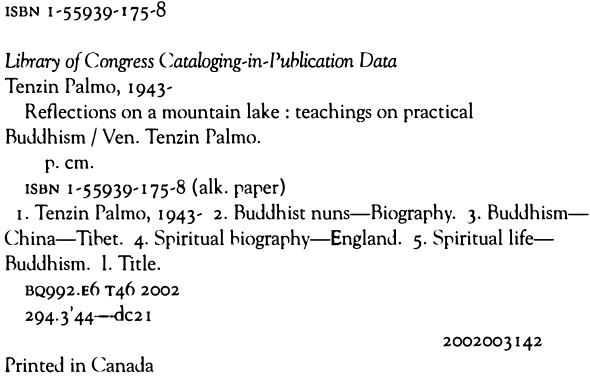

Contents
9 29 41 61 69 87 105 121 159 179 185 205 223 237

Preface
 r----IHIS BOOK GREW out of a series of talks that I gave in the United States in 1996/97 and in Australia in 1998, which were recorded and later transcribed and edited for publication.
r----IHIS BOOK GREW out of a series of talks that I gave in the United States in 1996/97 and in Australia in 1998, which were recorded and later transcribed and edited for publication.
When I am invited to speak I often prefer that the hosts select a subject, on which I then speak extemporaneously. I usually don't know precisely what I am going to say or just where the talk is heading. This open-endedness allows me to respond to the particular audience at hand, and also makes the discussions more lively. However, as a result, these talks do not present an exhaustive analysis of the subject under discussion, but merely what seemed important at the time.
Inevitably there is also some overlap and duplication, which has been edited out in some cases and allowed to remain in others where it seemed that the point needed emphasis or that the repetition formed a part of the whole explanation.
In the East and West, the nature of the audiences hearing Dharma teachings is very different. In the East, monks and nuns, who are the professionals so to say, make up the bulk of hearers at any Dharma discourse. But in the West the vast majority of the audience are lay people who often have a sincere interest in the Dharma but relatively little time for formal practice. In each case the perspective of the discourse must accommodate the needs of the listeners.
In this hook I have tried to present things in a way which would he both useful and relevant, not of merely academic interest or too remote to he applied to our everyday situations. So I mostly use everyday language and try to make the teachings accessible to any person of average intelligence. The Lord Buddha himself used the common speech of his day to express technical meanings. For instance the word "skandha," translated as "aggregate" or "psycho-physical component," literally means a "heap" of something. He also made use of everyday examples and stories to elucidate his meaning. So there is no need for the I)harma to seem obscure and difficult to penetrate.
This hook would never have come into being if not for the devoted effort of many friends and helpers. The easiest part was mine, who merely had to chatter away before friendly audiences. Then came the tedious and demanding task of transcribing those endless hours of talk and putting it all into some sort of order and coherence. It took weeks and months of dedicated labor to complete that task and my gratitude and amazement are both immense. In particular I must thank Venerable Tenzin Wangmo for organizing the transcription of the Australian tapes, which was faithfully undertaken by Sonia Davies, Christina Peeples, Jennie Beswick and Wangmo (Whitethom). The American tapes were transcribed with great diligence and devotion by Arya Aham (Francesca Jenkins). My sincere thanks are also due to the editors at Snow Lion, who went through the whole manuscript and made many valuable suggestions. Above all I owe a deep debt of gratitude to Pauline Westwood, who not only helped transcribe the tapes but also took on the onerous task of selection and editing. This hook is due as much to their work as to my words. To all of the above and the others whose names have not been mentioned, I say thank you from my heart.

I
A Western Yogini
 AM Toth that I'm supposed to talk about my experiences in retreat. I think that's probably the last thing I would ever want to talk about! I don't know what you want to know, so I will begin by describing how I got to my retreat in the first place. Let's start at the beginning and see where we go. I was born in England and brought up in London during the war. My mother was a spiritualist and we had seances in our house every Wednesday evening, with tables flying around the room and that sort of thing. I am very grateful for this background because it meant that from an early age I believed in the continuity of consciousness after death. In fact, death was a frequent topic of conversation in our family, so I never felt any fear or reservations about it. I suppose I think about death every day in some way or other. An awareness of death gives great meaning to life.
AM Toth that I'm supposed to talk about my experiences in retreat. I think that's probably the last thing I would ever want to talk about! I don't know what you want to know, so I will begin by describing how I got to my retreat in the first place. Let's start at the beginning and see where we go. I was born in England and brought up in London during the war. My mother was a spiritualist and we had seances in our house every Wednesday evening, with tables flying around the room and that sort of thing. I am very grateful for this background because it meant that from an early age I believed in the continuity of consciousness after death. In fact, death was a frequent topic of conversation in our family, so I never felt any fear or reservations about it. I suppose I think about death every day in some way or other. An awareness of death gives great meaning to life.
As a child, I believed that we are all innately perfect, that our original nature was perfection, and that we are here to discover who we really are. I believed that we have to keep coming back again and again until we uncover our original perfect nature. The question for me was, "How do we become perfect?" I raised this question with many people who I thought might know, such as teachers and priests. I even asked the spirit-guides during a seance. Everybody seemed to reply along similar lines, saying, "Well, you have to he good," or "You have to he kind." But even though I was only a small child, I remember thinking, "Yes, of course, but that's not all there is to it." Naturally people needed to he good and kind. However, I knew people who were very good and very kind, but who were nonetheless not perfect. I knew that perfection lay beyond that. Being good and kind was the foundation, but there was something more we needed to do. I didn't know what. Throughout my adolescence, I searched for the answer to "How do we become perfect? What does perfection mean? What is it that I'm looking for?" I tried different religions. I remember discussing religion with various priests and vicars. My sister-in-law was Jewish, and I discussed God with her. When I was about thirteen, I attempted to read the Koran, but didn't get very far. The problem for me was that all these religions started with the notion of a soul and the soul's relationship with its creator. The path laid out was a path of devotion, of the soul seeking its creator outside itself. But this had no meaning for me. As far as I was concerned, God was a sort of superior Santa Claus.
When I was eighteen, I became interested in existentialism, and I read Sartre and Camus. I was working in a library at the time, and one day I happened to pick up a small hook entitled The Mind Unshaken. I liked the title. It was written by an English journalist about his time in Thailand. It gave the very basics of Buddhism-the Four Noble Truths, the Noble Eightfold Path, the Three Characteristics of Existence, and that sort of thing. I still vividly remember what an outstanding revelation it was to learn that there was a perfect path already set out and that it embraced all the things I already believed in. To think that there could actually he a religion that taught this was truly amazing to mne! All the other religions I had encountered posited a deity as a sine qua non. In contrast, Buddhism was a path which led inwards, rendering any notion of an external creator or God totally superfluous. When I was halfway through the hook, I said to my mother, "I'm a Buddhist." And she said, "That's nice, dear. Finish reading the hook and then you can tell me all about it." Six months later she became a Buddhist too.
Next page

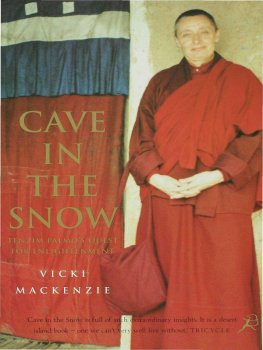
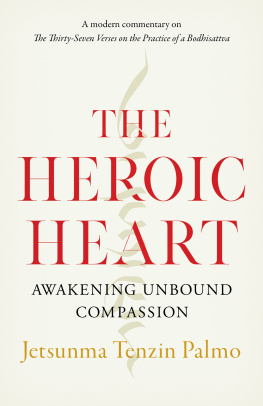
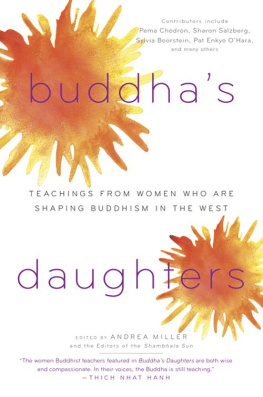
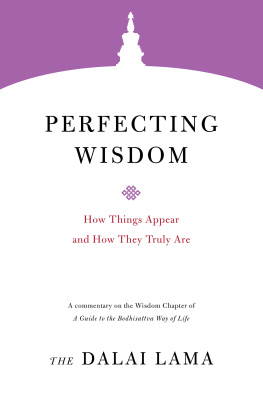
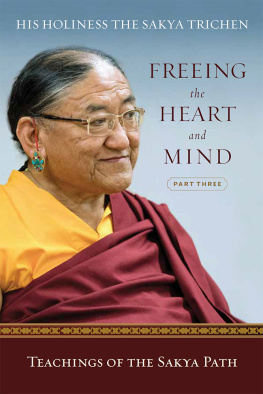
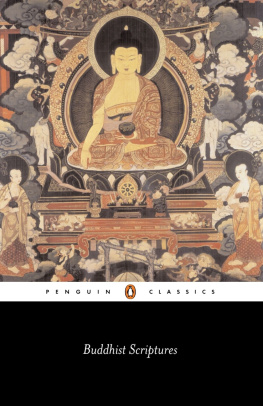
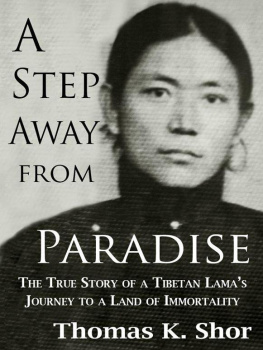
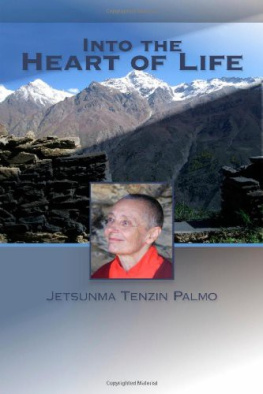








 r----IHIS BOOK GREW out of a series of talks that I gave in the United States in 1996/97 and in Australia in 1998, which were recorded and later transcribed and edited for publication.
r----IHIS BOOK GREW out of a series of talks that I gave in the United States in 1996/97 and in Australia in 1998, which were recorded and later transcribed and edited for publication.
 AM Toth that I'm supposed to talk about my experiences in retreat. I think that's probably the last thing I would ever want to talk about! I don't know what you want to know, so I will begin by describing how I got to my retreat in the first place. Let's start at the beginning and see where we go. I was born in England and brought up in London during the war. My mother was a spiritualist and we had seances in our house every Wednesday evening, with tables flying around the room and that sort of thing. I am very grateful for this background because it meant that from an early age I believed in the continuity of consciousness after death. In fact, death was a frequent topic of conversation in our family, so I never felt any fear or reservations about it. I suppose I think about death every day in some way or other. An awareness of death gives great meaning to life.
AM Toth that I'm supposed to talk about my experiences in retreat. I think that's probably the last thing I would ever want to talk about! I don't know what you want to know, so I will begin by describing how I got to my retreat in the first place. Let's start at the beginning and see where we go. I was born in England and brought up in London during the war. My mother was a spiritualist and we had seances in our house every Wednesday evening, with tables flying around the room and that sort of thing. I am very grateful for this background because it meant that from an early age I believed in the continuity of consciousness after death. In fact, death was a frequent topic of conversation in our family, so I never felt any fear or reservations about it. I suppose I think about death every day in some way or other. An awareness of death gives great meaning to life.